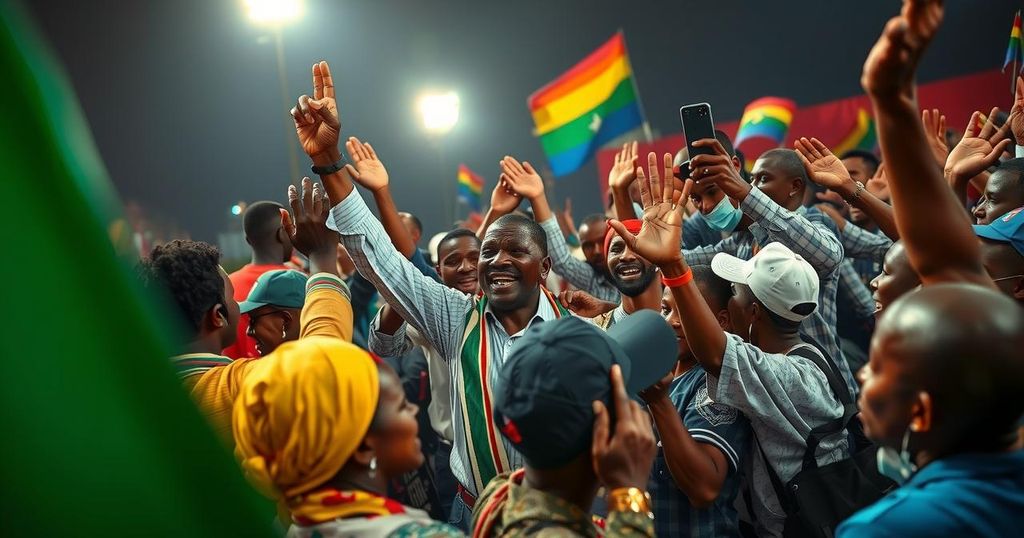Senegal’s Ruling Party Secures Victory in Legislative Elections
Senegal’s ruling party PASTEF has claimed victory in the legislative elections, which follows President Bassirou Diomaye Faye’s earlier win in the presidential race. With most ballot counts finalized, local leaders acknowledge the outcome, while opposition figures voice allegations of fraud amidst ongoing public discontent regarding the economic situation. PASTEF’s parliamentary control now enables Faye to advance his reform agenda, despite facing legacy issues from the previous administration’s governance.
Senegal’s ruling PASTEF party has declared a significant victory in the recent legislative elections held on Sunday, following the successful presidential campaign of President Bassirou Diomaye Faye a few months prior. With nearly all ballots counted, local media outlets reported that PASTEF triumphed in most polling stations, paving the way for Faye to advance his ambitious reform initiatives. Government spokesman Amadou Moustapha Ndieck Sarre expressed gratitude to the populace for their support, affirming, “I pay homage to the Senegalese people for the large victory that it has given to PASTEF.” In a notable concession, the leaders of Senegal’s two main opposition parties acknowledged the electoral outcome even as counting was ongoing. Barthelemy Dias, representing the SAMM Sa Kaddu coalition, extended his congratulations to PASTEF, stating, “I would like to congratulate PASTEF, the winner of the election.” However, former President Macky Sall, leading an opposition faction from abroad, accused PASTEF of orchestrating fraudulent actions, though he did not provide further evidence for these allegations. The successful legislative elections bolster President Faye’s ability to implement his promised reforms, which had previously been impeded by the opposition-held parliament. His administration aims to address crucial issues such as corruption, foreign fishing permits, and equitable distribution of national resource revenues. Despite facing legal challenges and accusations of political motivations behind such prosecutions, both Faye and his adviser, Prime Minister Ousmane Sonko, appear less obstructed in their governance now. Former President Sall, who has historically refrained from political activities, faced criticism for stirrings of unrest prior to the elections, while Amadou Ba, the former prime minister, also led a coalition in hopes of regaining influence. Although the campaign season included isolated skirmishes and provocative remarks, it remained largely peaceful. Addressing economic concerns, the current government contends that the previous administration left a more extensive budget deficit than initially acknowledged, leading to the suspension of an IMF aid program. Senegal also grapples with over 20% unemployment, prompting citizens to risk perilous journeys to Europe. Despite these challenges, the current administration has made efforts to reduce the prices of essential goods like rice, oil, and sugar, striving to fulfill election commitments while navigating a strained budget.
Senegal recently held legislative elections amid a backdrop of political tension and public scrutiny, particularly following the inauguration of President Bassirou Diomaye Faye earlier this year. His party, PASTEF, faced various challenges from opposition factions resisting crucial reforms. The economic situation, marked by high unemployment rates and public dissatisfaction, has compounded the difficulties for the new administration. This election was pivotal for Faye’s ability to move forward with his policy agenda, as control of the parliament would significantly influence legislative outcomes. The political landscape in Senegal has been characterized by profound rivalry and engagement from former leaders, with accusations of manipulation and electoral malpractice surfacing during the campaign. The international community remains watchful of Senegal’s political and economic developments, particularly concerning its commitment to democracy and governance.
The electoral success of Senegal’s ruling party, PASTEF, establishes a foundation for President Faye to pursue his reform agenda effectively. Concessions from opposition leaders signify a shift towards political acceptance; however, allegations of fraud from former President Sall highlight persistent tensions. Economic challenges remain a critical concern for the new administration, particularly as they navigate budgetary constraints and public expectations. The outcome of this election will be pivotal for Senegal’s trajectory towards stability and progress in governance.
Original Source: www.dw.com




Post Comment